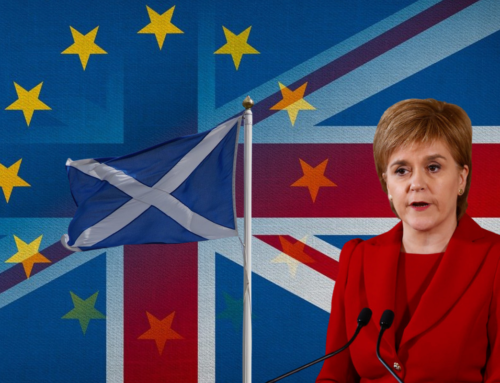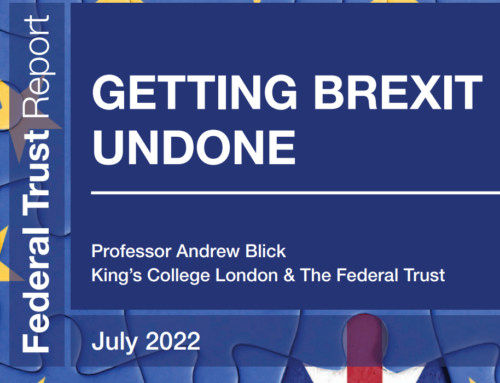By Brendan Donnelly, Director, The Federal Trust for Education & Research
Until the time of writing (15th July) the chaos wreaked on the United Kingdom by the disruptive and unexpected outcome of Mr. Cameron’s referendum on 23rd June has been more obviously political than economic. The personal ambitions and resentments of the leading personalities in the “Leave” campaign have spilled over into a Jacobean drama of revenge and treachery which has diminished our country in the eyes of the rest of world. At times, it has appeared that the UK’s likely exit from the European Union was simply a collateral consequence of the dysfunctional Conservative Party, a consequence not necessarily desired by all its apparent advocates. Despite this febrile background, we now however know and understand more about a number of issues which will be central to the process of attempting to terminate British membership of the European Union.
Triggering Article 50
When speaking during the referendum campaign about his reaction to a possible vote to leave the European Union on 23rd June, Mr. Cameron claimed that he would accept this “instruction” from the British people and rapidly (perhaps at the European Council in the following week) invoke Article 50 of the Lisbon Treaty, the mechanism whereby member states may secede from the European Union. In the event, Mr. Cameron resigned as Prime Minister on the morning of 24th June and indicated that it would be for his successor, who at that stage seemed unlikely to emerge before September, to decide when to trigger Article 50. His unexpectedly rapid successor, Theresa May, has insisted in her turn that she will be in no hurry to make this invocation. It is unsurprising that she should want to allow herself some time to reflect upon the many challenges and pitfalls intrinsic to the implementation of the contradictory and often unrealizable aspirations which promoted the vote for BREXIT on 23rd June. Some critics have reproached the British civil service for not having worked out before the referendum a coherent plan for taking the United Kingdom out of the European Union. This is unfair. Confusion and self-contradiction were integral to the “Leave” campaign. No coherent plan could ever have been devised by civil servants to implement their chaotic prospectus.
This proposed delay in triggering Article 50, while understandable, has not been entirely welcome to the UK’s European partners. There is an understandable desire to resolve quickly and definitively a problem for the rest of the Union manufactured exclusively in London. As an incentive to speedy British action, the European Council has made clear there can be no informal negotiations about British exit from the Union until Article 50 has been triggered. Article 50 sets a time limit of two years for the completion of negotiations under it. These initial frosty exchanges between the United Kingdom and its present partners in the European Union suggest that once Article 50 is triggered it may be difficult to achieve any extension of this deadline. If Mrs. May invokes Article 50 later this year, the United Kingdom will almost certainly cease to be a member of the European Union by the end of 2018.
It must however be stressed, a point that has become more generally acknowledged since 23rd June, that the United Kingdom’s exit from the European Union and the establishment of a long-term framework for relations between the UK and the continuing EU are separate processes, and there may well be a gap in time between the realization of the former and conclusion of the latter. The Commission has gone as far as to suggest that negotiations for the UK to join the European Economic Area or any similar arrangement can only begin once the agreement arising from Article 50 has been signed. This latter agreement would only settle such largely administrative matters as pensions for former British officials of the Union, the winding up of multi-annual European programmes and the status of the Commission Office in London. It is entirely possible that another two or three years would then elapse between the signature of the “divorce” agreement and the conclusion of a more general treaty on future relations between the EU and the United Kingdom. Presumably the then Foreign Secretary Philip Hammond had such a timetable in mind when he spoke of its taking “six years” for the United Kingdom fully to leave the EU. There is a real risk of a damaging and destabilizing temporal gap of several years in which the United Kingdom will be outside the European Union but will have no successor agreement to regulate its commercial and other relations with the Union.
The role of the Westminster Parliament
There has been considerable debate, both legal and political, about the desirability of or indeed possible necessity for a Parliamentary vote before the Prime Minister begins the Article 50 process. At one level, this debate is inconsequential, since it is clear that both the main parties in the House of Commons will overwhelmingly support (or at least not oppose) any decision by Mrs. May to invoke the Article. At a deeper level, however, the debate is one of considerable significance. It throws the harshest possible light on the ill-considered way in which the EU referendum was called by the former Prime Minister; and it demonstrates the perhaps unbearable strains to which our slapdash British constitutional arrangements are currently being exposed.
In other mature democracies, there is a specified procedure for the calling of referendums, and a clear, generally accepted understanding of their legal implications. It is highly unusual that, particularly on issues of great constitutional significance, a simple majority of those who happened to vote on a particular day should be regarded as binding upon the Parliamentarians who have to transpose into legal acts the usually inchoate popular wishes expressed in a plebiscite. High levels of participation in the referendum and a significant majority among those voting are standard requirements for the vote in any referendum to be binding upon legislators. In federal systems moreover there is normally a stipulation protecting in some way or another the rights of individual states within the federation against an oppressive majority. The contrast with the British case could not be more stark. As a simple instrument of internal party management, Mr. Cameron committed the country in early 2013 to a referendum on British membership of the European Union before 2017. Because he complacently assumed that he would win this referendum, the former Prime Minister gave no thought to the constitutional implications of his dangerous tactics. In consequence, a narrow majority among those voting on 23rd June, comprising less than 38% of the whole British electorate, is now apparently a sufficient basis upon which to overturn forty years of well-entrenched co-operation between this country and its closest neighbours; to overrule the great majority of British parliamentarians wishing to remain in the European Union; and to set at risk the territorial integrity of the United Kingdom.
Many commentators in London have been surprised by the rapidity and vigour with which Nicola Sturgeon has moved to place on the political agenda a new referendum about Scottish independence. Some of this surprise was reasonably grounded in the impression the present First Minister gives of greater caution and prudence that her predecessor Alex Salmond normally exhibited. Much of the surprise however was simply a reflection of Anglocentric complacency and wishful thinking. The consequences of BREXIT for Scotland’s and indeed for Northern Ireland’s position within the United Kingdom seem to have formed little part of the concerns motivating English voters wishing to leave the European Union three weeks ago. Three of the jurisdictions making up the United Kingdom (Scotland, Northern Ireland and Gibraltar) voted substantially to remain within the European Union. The brushing aside of their vote if Article 50 is triggered can only have negative consequences for the solidity and stability of the United Kingdom.
With very few honourable exceptions, the present membership of the House of Commons seems, at least in the short term, to be willing to acquiesce in the questionable proposition that the vote of 23rd June represents a settled and unambiguous will of the British people which cannot be challenged or even interrogated. As often, this rhetorical obeisance to popular sovereignty is a mask for less elevated considerations. Both the Conservative Party and the Labour Party are frightened of losing votes to UKIP in a possibly premature General Election if they can be portrayed as saboteurs of the popular will. This has the extraordinary consequence that the 48% of voters on 23rd June who wanted to remain in the European Union now suddenly find themselves substantially unrepresented in the British Parliament. Many of those Labour MPs dissatisfied with Mr. Corbyn’s performance as leader of the Opposition have rightly criticized his negligible contribution to the referendum campaign. His most prominent critic Hilary Benn has however been at pains to stress that he regards the result of the referendum as unchallengeable. The transformation of the House of Commons almost overnight from a gathering of democratic representatives overwhelmingly favourable to British membership of the European Union to one regarding itself as absolutely mandated to destroy this membership by a small majority in a dishonestly fought plebiscite is not the least bizarre aspect of the political turmoil unleashed by the vote on 23rd June.
Possible future relations between the UK and the European Union
In a polemical exchange shortly after the EU referendum, Gisela Stuart MP urged the British Foreign Secretary, Philip Hammond, to “guarantee” the rights of EU citizens currently in this country. The Foreign Secretary refused, on the basis that such questions must form part of the overall negotiations between the UK and the EU about their future relations. There was of course a delicious irony in Ms. Stuart’s claimed solicitousness about the rights of EU citizens, rights which she has done so much to undermine over the past six months. The exchange was however revealing, both in highlighting the centrality of the question of free movement for future negotiations between the UK and in underlining the human and economic cost of the uncertainty generated by the outcome of the referendum on 23rd June.
There is certainly a case to be made for saying that, given the current state of British public attitudes to the European Union, membership for the UK of the European Economic Area or an associate membership in the Union having similar effect would be an appropriate outcome to any future negotiations on BREXIT. Such an outcome would preserve British access to the Union’s internal market, while recognizing that the free movement of individuals within Europe is a major plank of British economic stability and development. It would also be an outcome capable of relatively quick agreement with our European partners, perhaps even shortly after the conclusion of an Article 50 agreement for the United Kingdom to leave the European Union.
It can however already be seen that any such rational agreement, minimizing as it would uncertainty and disruption, is unlikely to be acceptable to great swathes of the governing Conservative Party, still less to those supporters of UKIP for whom restrictions on European immigration were at the core of their desire to leave the European Union. Mrs. May will inevitably have to tread carefully in her negotiations with the rest of the European Union and the upshot of her attempts to square a number of circles is wholly unpredictable. Our European partners probably already have in their minds a rough tariff of the degrees of limitation on free movement that they will be prepared to exchange for diminished access to the European internal market. It was a central proposition of the “Leave” campaign that no such tariff could or would be demanded, and that the United Kingdom would continue to enjoy essentially unrestricted access to the European market while “resuming control” completely of its borders. When Mrs. May reports to her party on the unrealizability of this fanciful combination, the party is very likely to blame her as messenger rather than itself for unrealistic expectations. The self-destructive preoccupation of the Conservative Party with the European issue is a gift that keeps on giving. More precisely, it would be such a gift if there were a political formation capable of benefitting from the opportunity proffered by the likely disarray on European issues of the governing party. In the light of the political turbulence which has characterized the past three weeks, it would be a rash commentator who would exclude the emergence of such a political formation in the coming months and years.







